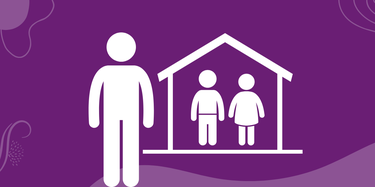Clearly explain why it was necessary to leave home and why relatives or friends may not have come with you. «They stayed at home because they made this decision/ could not leave with us/ help the elderly», etc.
Suggest that the child write a letter/card/drawing to share with relatives who are not nearby; for younger children, work together to write the letter.
Whenever possible, help the child to see and connect with relatives and peers at home through picture and video messages, video calls, and photos/videos.
Invite your child to share happy memories from home, including by playing a game that a loved one who is missing used to play with them or by drawing pictures of loved ones, one’s house or school, and toys that were left behind.
For younger children, limit watching and discussing news in the presence of your child. For adolescents, set up a time to watch the news together and to discuss what they heard and how it made them feel.
If the child is sad and crying due to missing home, give him or her the opportunity to grieve and cry, and say: "I understand you and why you are sad, I am sad too. I am here to talk when you want to." For smaller children, create a safe space to cry and feel sad. (e.g: «Let me be the mommy kangaroo, and you can jump into the pocket of the blanket and stay there and cry. And when you're ready/ready to calm down, you can jump out of this pocket»). When the child is ready, engage in a familiar activity together in order to re-stabilize.
For adolescents, provide support and encouragement when they share their feelings. If they cry, do not try to stop them immediately, and avoid statements such as "don't cry, you need to hold on", "don't think about it now", "stop talking about it", etc.). Rather, ask what kind of support the child needs.
Reassure the child that leaving home and separating from loved ones was not his or her fault. Children tend to self-blame, so it is important to explain why this is not the case.
Expressing anger and aggression is a common way to cope with distressing experiences. Teach your child that it is understandable and acceptable to be angry, but that anger should not be expressed in ways that hurt oneself or others. Instead, physical activity, like running, walking, and jumping can help to work out angry feelings.
Try to stick to a daily routine and rituals that were familiar at home: morning routines, walks, study time, bedtime reading, sleeping, etc. Create new rituals to make your new location feel special.
Physical affection can enhance comfort. If they want to do so, hug your child, hold hands, and cuddle.
If the child experiences severe distress that interferes with her/his ability to play, go to school, eat or sleep for multiple weeks, consider seeking help from a mental health professional.





